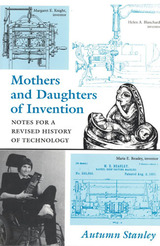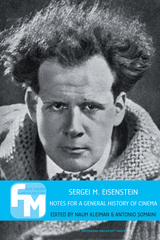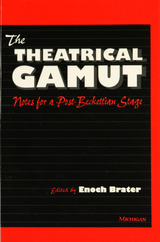4 books about Notes for

Mothers and Daughters of Invention
Notes for a Revised History of Technology
Stanley, Autumn
Rutgers University Press, 1995
Written in an engaging and accessible style, this first broadly focused compensatory history of technology not only includes women's contributions but begins the long-overdue task of redefining technology and significant technology and to value these contributions correctly. Stanley traces women's inventions in five vital areas of technology worldwide--agriculture, medicine, reproduction, machines, and computers--from prehistory (or origin) forward, profiling hundreds of women, both famous and obscure. The author does not ignore theory. She contributes a paradigm for male takeovers of technologies originated by women.
[more]

Notes for a Young Gentleman
Toby Litt
Seagull Books, 2017
Toby Litt is one of that rare breed of fiction writers who never writes the same book twice: every time out, he takes an unexpected new tack—and his readers happily follow.
Told in the form of the pithy, even lyrical advice a young soldier leaves behind after a mission gone wrong, Notes for a Young Gentleman is no exception. Its brilliantly creative form, and the epigrammatic genius Litt displays in its creation, nonetheless can’t hide the powerful, emotional story at its heart: of a young soldier parachuting toward a beautiful, moonlit country house on a mission . . . of betrayal. The house? Marlborough. The target? Winston Churchill, an old friend of his father. A brilliant, at times dizzying but always heartfelt exploration of love, revenge, and the essence of a gentleman, Notes for a Young Gentleman is classic Toby Litt: wholly new and wholly unforgettable.
Told in the form of the pithy, even lyrical advice a young soldier leaves behind after a mission gone wrong, Notes for a Young Gentleman is no exception. Its brilliantly creative form, and the epigrammatic genius Litt displays in its creation, nonetheless can’t hide the powerful, emotional story at its heart: of a young soldier parachuting toward a beautiful, moonlit country house on a mission . . . of betrayal. The house? Marlborough. The target? Winston Churchill, an old friend of his father. A brilliant, at times dizzying but always heartfelt exploration of love, revenge, and the essence of a gentleman, Notes for a Young Gentleman is classic Toby Litt: wholly new and wholly unforgettable.
[more]

Sergei M. Eisenstein
Notes for a General History of Cinema
Edited by Naum Kleiman and Antonio Somaini
Amsterdam University Press, 2016
One of the iconic figures of the twentieth-century cinema, Sergei Eisenstein is best known as the director of The Battleship Potemkin, Alexander Nevskii and Ivan the Terrible. His craft as director and film editor left a distinct mark on such key figures of the Western cinema as Nicolas Roeg, Francis Ford Coppola, Sam Peckinpah and Akiro Kurosawa.This comprehensive volume of Eisenstein’s writings is the first-ever English-language edition of his newly discovered notes for a general history of the cinema, a project he undertook in 1946-47 before his death in 1948. In his writings, Eisenstein presents the main coordinates of a history of the cinema without mentioning specific directors or films: what we find instead is a vast genealogy of all the media and of all the art forms that have preceded cinema’s birth and accompanied the first decades of its history, exploring the same expressive possibilities that cinema has explored and responding to the same, deeply rooted, “urges” cinema has responded to. Cinema appears here as the heir of a very long tradition that includes death masks, ritual processions, wax museums, diorama and panorama, and as a medium in constant transformation, that far from being locked in a stable form continues to redefine itself.
The texts by Eisenstein are accompanied by a series of critical essays written by some of the world’s most qualified Eisenstein scholars.
The texts by Eisenstein are accompanied by a series of critical essays written by some of the world’s most qualified Eisenstein scholars.
[more]

Theatrical Gamut
Notes for a Post-Beckettian Stage
Enoch Brater, Editor
University of Michigan Press, 1995
This collection of original essays in honor of American drama critic Ruby Cohn captures the rich mixture of discourses on the act of theater. The variety of approaches -- from formalist to feminist -- pays tribute to the centrality of Beckett in any evaluation of just what constitutes the "modern" in modern, contemporary, postmodern, and experimental drama. The essays devote attention to playwrights like Sam Shepard, Caryl Churchill, David Hare, Jane Bowles, Arthur Miller, and Suzan-Lori Parks and urge us as well to reconsider Shakespeare, Strindberg, and such visionary theater practitioners as Antonin Artaud and Joseph Chaikin. They also investigate the dynamics of actor, character, and audience, and offer insights into contemporary German theater, Noh drama, and Balinese theatrical practices. Whatever their subject, these suggestive and original pieces always bring us back to Beckett in fresh and surprising ways.The contributors are H. Porter Abbott, Linda Ben-Zvi, Herbert Blau, John Russell Brown, Sue-Ellen Case, William Coco, Elin Diamond, Bernard Dort, James Eigo, Martin Esslin, Carla Locatelli, John Orr, Janelle Reinelt, Antonia Rodriguez-Gago, Yasunari Takahashi, and Hersh Zeifman."Any enthusiastic student of drama--whether professor or undergraduate, theater historian or theater critic, member of acting company or member of an audience--will find The Theatrical Gamut both enlightening and provocative."--Jill Levenson, University of Toronto
[more]
READERS
Browse our collection.
PUBLISHERS
See BiblioVault's publisher services.
STUDENT SERVICES
Files for college accessibility offices.
UChicago Accessibility Resources
home | accessibility | search | about | contact us
BiblioVault ® 2001 - 2025
The University of Chicago Press









